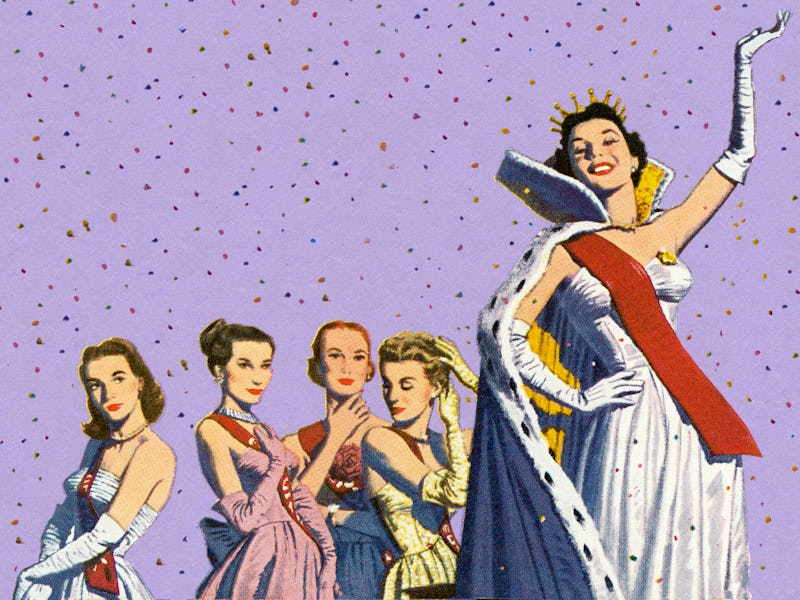This deadly sin is actually your "secret decision-making superpower"
Envy can be used for good.

In the sixth century, Pope Gregory I presented the seven "deadly" sins. These seven vices — pride, greed, lust, envy, gluttony, wrath, and sloth — were considered the most dreaded and despicable emotions humans could experience.
Envy has gotten a particularly bad wrap. That’s likely why when people compare themselves to others and experience that familiar feeling, they try to extinguish it and move on.
But, according to emotions expert Liz Fosslien, we've been thinking about envy all wrong. Envy can actually be people's "secret decision-making superpower," Fosslien says, unearthing buried desires and goals, and helping them make better decisions.
"Envy happens because there's a need you have that's not being met," Fosslien tells Inverse. "When you feel overcome by envy, it can actually crystallize for you what it is that's missing from your life, what it is you want, and then help you move towards that."
This week, Inverse explores how reframing envy in a positive light can transform this uncomfortable emotion into something productive.
Next time you feel "green" with envy, don't run from it, Fosslien advises. Instead, sit with that emotion, and if it persists long enough, interrogate the feeling to determine if it's a signal to move in a new direction.
I’m Ali Pattillo and this is Strategy, a series packed with actionable tips to help you make the most out of your life, career, and finances.
A deadly sin do-over— Envy, like all emotions, is universal. It's that feeling when you’re scrolling through Instagram wishing to be transported to a friend's epic vacation. Or a coworker gets promoted and you imagine the praise and glory that might come if you were the one moving upward.
No one is immune to envy, and, generally, it makes us "feel really bad," Fosslien says.
"Envy is when we covet what someone else has and want it for ourselves," Fosslien explains. It is associated with feelings of discontent or resentful longing, she adds.
"If you're jealous of someone, you just immediately ignore it. Or you do all kinds of mental gymnastics to say, 'No, I should be grateful for what I have; I shouldn't feel this way.'"
"Examining envy can be really, really productive."
In extreme cases, people often distance themselves from those they are jealous of. Sometimes, they lash out -- acting bitterly or making snide comments to undermine the subject of their envy.
"If you actually stop and listen, you're envious because the person has something that you want," Fosslien explains. "And it might be useful to know that."
Reframing envy— Fosslien has four strategies to use envy for good:
- Freeze: If you're having a strong emotional reaction, pause. Acknowledge that you are feeling envy and then see if you can let it wash over you. "Every feeling is momentary -- it's not going to last forever,” she says. “So you don't want to make a decision or do something rash when you're feeling that emotion most intensely."
- Drill down: Ask yourself, what triggered that envy? Pinpointing the root of the emotion can help you determine your personal goals and desires. If someone was staffed on a project you admire, think through whether you'd actually want that responsibility or role. Or, do you just want the recognition or prestige that comes with that project?
- Make a plan: If your feelings of jealousy persist consistently (over weeks or months), that's a signal it may be time to pursue the object of your envy. Ask yourself: What can I do to make that goal a reality? That could mean talking with your manager, doing research, or even switching up your career or lifestyle.
- Connect with others: While people often distance themselves or reject a person they're jealous of, Fosslien says it's more useful to go to that person for advice or mentorship regarding how they got what you want.
Taking these steps to interrogate and act on envy can turn the often negative emotion into a positive one. “If you look at envy more carefully, as opposed to saying, 'Oh, I'm envious. That's bad. I'm a bad person. I'm just gonna stuff this away in a box,' there's actually something really valuable there," Fosslien says, so long as you're not acting bitterly towards others or letting envy consume you.
"Examining envy can be really, really productive, and actually set you up to be in a place where you're much happier a year from now.”